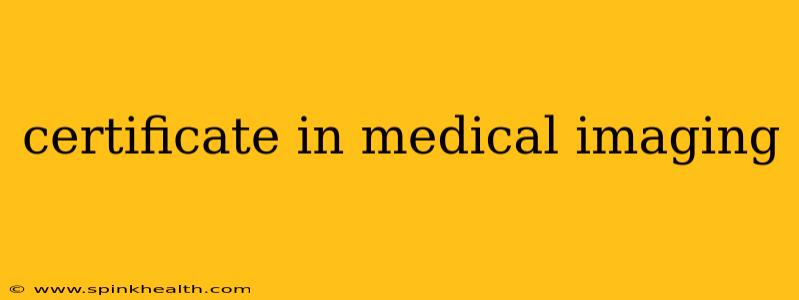The world of medical imaging is a fascinating blend of cutting-edge technology and compassionate care. It's a field where precision and dedication are paramount, playing a crucial role in diagnosing and treating a wide range of medical conditions. If you're drawn to this dynamic field and are considering a certificate in medical imaging, you're embarking on a rewarding path. This comprehensive guide will navigate you through the process, answering common questions and illuminating the opportunities that await.
What is a Medical Imaging Certificate?
A medical imaging certificate program provides focused training in specific areas of medical imaging technology. Unlike a full degree, these programs typically concentrate on practical skills and hands-on experience, making them ideal for individuals seeking to transition into the field or enhance their existing qualifications. These certificates offer a direct route to entry-level positions, offering valuable expertise in the operation and maintenance of imaging equipment, alongside image interpretation and patient care principles.
What types of medical imaging techniques are covered in certificate programs?
Medical imaging certificates offer a diverse range of specializations. Commonly covered techniques include:
- Radiography: This foundational area focuses on the use of X-rays to create images of the body's internal structures.
- Sonography (Ultrasound): Using high-frequency sound waves to create images, sonography is widely used in obstetrics, cardiology, and other specialties.
- Computed Tomography (CT): CT scans use X-rays and computer processing to generate detailed cross-sectional images of the body.
- Magnetic Resonance Imaging (MRI): MRI uses powerful magnetic fields and radio waves to create highly detailed images of internal organs and tissues.
- Mammography: Specialized in breast imaging, mammography plays a critical role in early breast cancer detection.
Many programs allow for specialization within these areas, letting you tailor your training to your specific interests and career goals.
What are the admission requirements for a medical imaging certificate program?
Admission requirements vary depending on the institution and the specific program. However, most programs require a high school diploma or equivalent and may require specific prerequisite courses, like anatomy and physiology. Some programs may also consider applicants with prior healthcare experience. It's essential to check with individual programs for precise requirements.
How long does it take to complete a medical imaging certificate program?
The length of a medical imaging certificate program can range from a few months to a couple of years, depending on the program's intensity and specialization. Some programs are designed to be completed part-time, accommodating the schedules of working professionals.
What are the job prospects after completing a medical imaging certificate?
Graduates with medical imaging certificates often find employment in hospitals, clinics, diagnostic imaging centers, and physician offices. Job titles may include:
- Medical Imaging Technologist
- Radiologic Technologist
- Ultrasound Technician
- CT Technologist
- MRI Technologist
- Mammography Technologist
The demand for skilled medical imaging professionals is consistently high, driven by the growing aging population and advancements in medical technology.
What is the difference between a medical imaging certificate and an associate's degree?
While both provide valuable training, a certificate focuses more intensely on practical skills and a specific area of medical imaging, while an associate's degree offers a broader foundation in healthcare, encompassing related areas like patient care and medical terminology. An associate's degree might be preferred for those seeking greater career flexibility or a pathway to further education.
Is a medical imaging certificate worth it?
The value of a medical imaging certificate hinges on your individual career aspirations and circumstances. If you're seeking a focused, efficient pathway into a specific area of medical imaging with a strong job market, then a certificate can be an excellent investment. It provides the essential skills and hands-on experience needed to launch a successful career in this rewarding field. However, carefully research specific program reputations and job placement statistics before making a decision.
This journey into the world of medical imaging demands dedication, precision, and a genuine desire to make a difference. With the right training and commitment, a medical imaging certificate can be your key to unlocking a fulfilling and impactful career.

